Best Links From 2019
Every week, I send a newsletter that contains a collection of interesting links and ideas.
I think of this section as an open-sourced bookmarks tab that anyone can reference. Patrick Collison calls the links roundup “an underrated artifact.”
There’s so much content out there that it is hard to know what to spend your time learning. I’ve done the work of digging through blogs, scientific papers, and newsfeeds to select the most impactful ideas. These links are my humble suggestion for your own reading.
Sections:
- Culture
- Business
- Science
- Economics & Government
- Nature
Culture
This section contains stories, statistics, and anecdotes that relate to large scale human behavior.
American and British children want to be rockstars. Chinese students want to be astronauts.
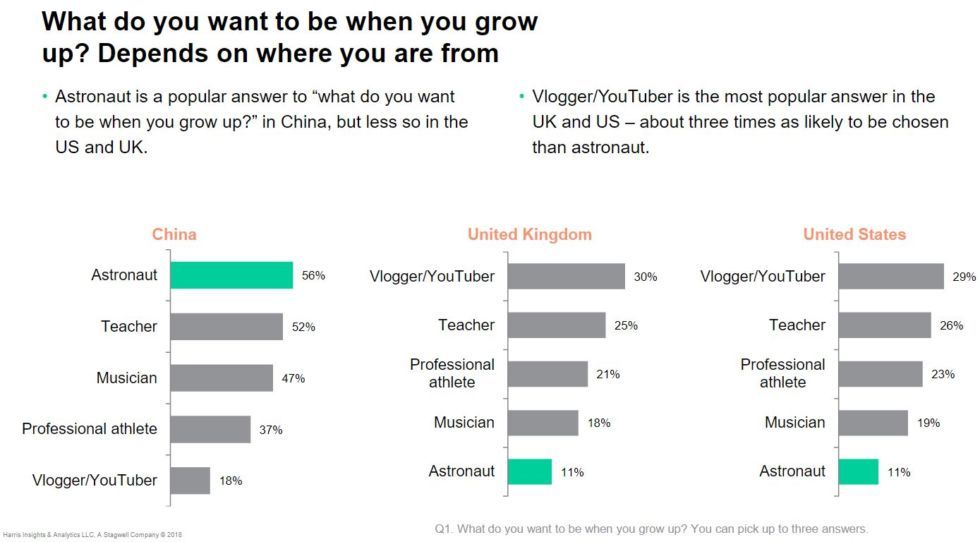
There is a wire encompassing Manhattan called an “eruv” that acts as a symbolic boundary for members of the Jewish faith.
Under Jewish law on the Sabbath, members of the faith are not allowed to carry objects within a public domain. When the eruv is intact, the area inside is not considered public.
Online Dating Is Now The Most Common Way That Couples Meet (U.S.)
The most traditional ways of meeting for heterosexual couples, i.e. meeting through family, meeting through church, meeting in the neighborhood, and meeting in primary or secondary school, have all been declining sharply since 1940.
40% of couples in the US met online. This number increases to 65% for same sex couples.
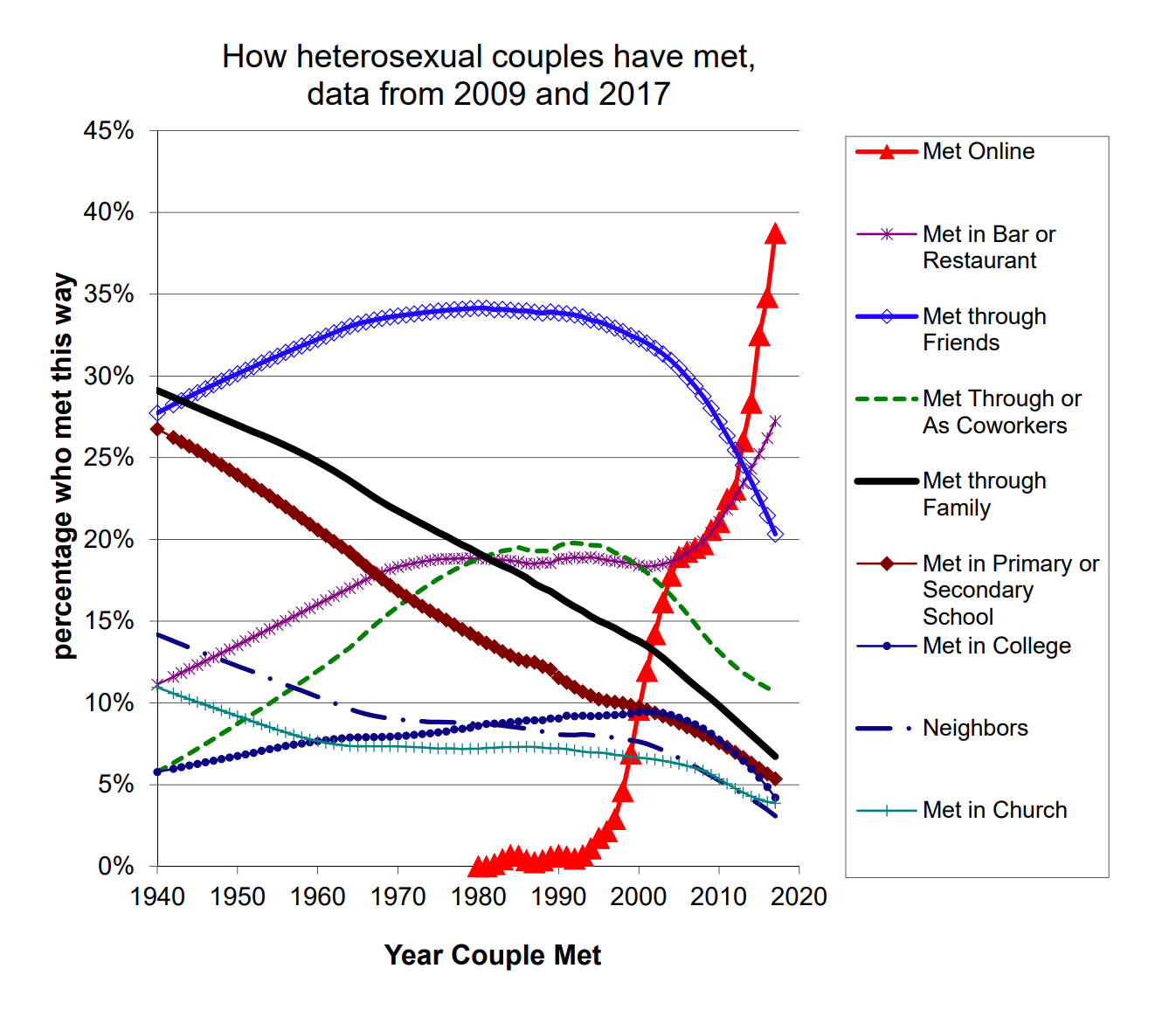
Business
This section contains insightful memos, oral histories, and insider perspectives on key moments for the world’s most successful businesses.
How Amazon Prime Came To Be
An oral history of the executives and decisions leading up to Amazon Prime. It was not an obvious decision. The best part of this recollection is the quotes from the staff who worked on this project.
The thing I remember very distinctly is this phrase: “I want to draw a moat around our best customers. We’re not going to take our best customers for granted.”
He said something along the lines of: I’m going to change the psychology of people not looking at the pennies differences between buying on Amazon versus buying somewhere else.
A New York Times article from 2013 on the first iPhone release.
The secrecy, deadlines, and pressure from Steve Jobs to deliver are highlighted in exquisite detail. The iPhone was a smashing success, so this template became the playbook. This article gives a perspective that peeks behind the curtain to the men and women who worked for years to make it a reality.
An investment thesis on why YouTube was going to be a hit … in 2005.
This investment memo from Sequoia gives a rare insight into how top-tier VC firms make decisions. Within 12 months of this memo, Google purchased YouTube for $1.65B.
How A Group of Developers Killed Internet Explorer 6
A funny and insightful story from an early Youtube engineer on their plot to kill Internet Explorer 6. Shortly after the Google acquisition, the team used a backdoor called ‘OldTuber’ to bypass the standard production release guidelines. Anecdotes like this help to illustrate the power that developers often have in shaping large scale decision making, especially in popular consumer apps.
This story also acts a wonderful anecdote of Patrick Collison’s question: “How do you ensure an adequate replacement rate in systems that have no natural way to die?”
An open letter from a Google engineer on Google (not) being a platform company. Amazon does platforms well because they are willing to “eat their own dogfood”.
The author, on why Amazon had succeeded as a platform company:
So one day Jeff Bezos issued a mandate. He's doing that all the time, of course, and people scramble like ants being pounded with a rubber mallet whenever it happens. But on one occasion -- back around 2002 I think, plus or minus a year -- he issued a mandate that was so out there, so huge and eye-bulgingly ponderous, that it made all of his other mandates look like unsolicited peer bonuses.
The mandate:
- All teams will henceforth expose their data and functionality through service interfaces.
- Teams must communicate with each other through these interfaces.
- There will be no other form of interprocess communication allowed: no direct linking, no direct reads of another team's data store, no shared-memory model, no back-doors whatsoever. The only communication allowed is via service interface calls over the network.
- It doesn't matter what technology they use. HTTP, Corba, Pubsub, custom protocols -- doesn't matter. Bezos doesn't care.
- All service interfaces, without exception, must be designed from the ground up to be externalizable. That is to say, the team must plan and design to be able to expose the interface to developers in the outside world. No exceptions.
- Anyone who doesn't do this will be fired.
- Thank you; have a nice day!
Science
This section contains scientific ideas, papers, and discoveries that changed how I think about our Universe.
The Sun follows the rhythm of the planets
Similar to how the moon causes tides on Earth, it appears that the planets cause a similar phenomenon in the sun’s magnetic field.

Researchers claim that planetary orbital cycles are the cause of regularly recurring solar activity that has puzzled the scientific community. Similar to tidal forces on Earth caused by the Moon, the planets’ gravitational effects trigger an oscillation that sets off a complex perturbation within the plasma layer of our star.
Rules For Time Travelers from Caltech Physics Professor Sean Carroll
- There are no paradoxes.
- Traveling into the future is easy.
- Traveling into the past is hard — but maybe not impossible.
- Traveling through time is like traveling through space.
- Things that travel together, age together.
- Black holes are not time machines.
- If something happened, it happened.
- There is no meta-time.
- You can’t travel back to before the time machine was built.
- Unless you go to a parallel universe.
- And even then, your old universe is still there.
Economics & Government
This section contains statistics, theories, and concepts that explain how people interact with money.
The median income in San Fransisco is significantly higher than the rest of the United States.
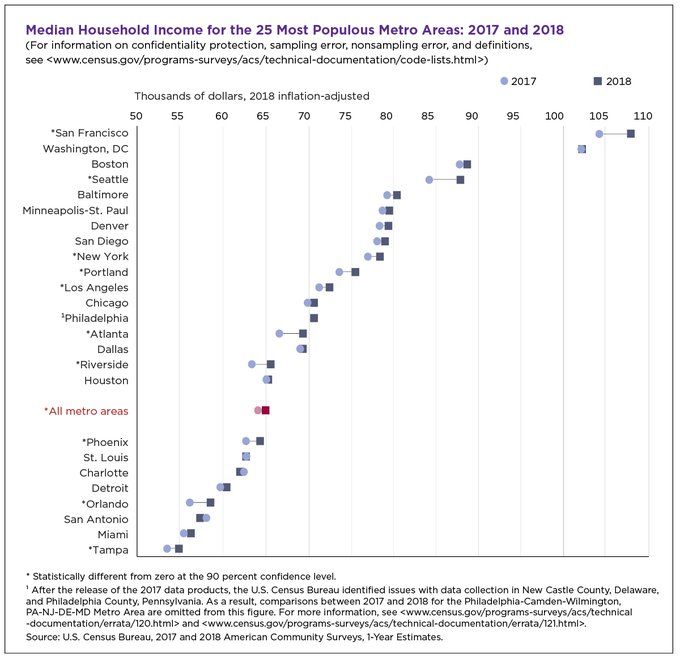
Most democracies are younger than the average millennial.
Despite the newness of the phenomenon, over half of the world’s population lives in a democracy.
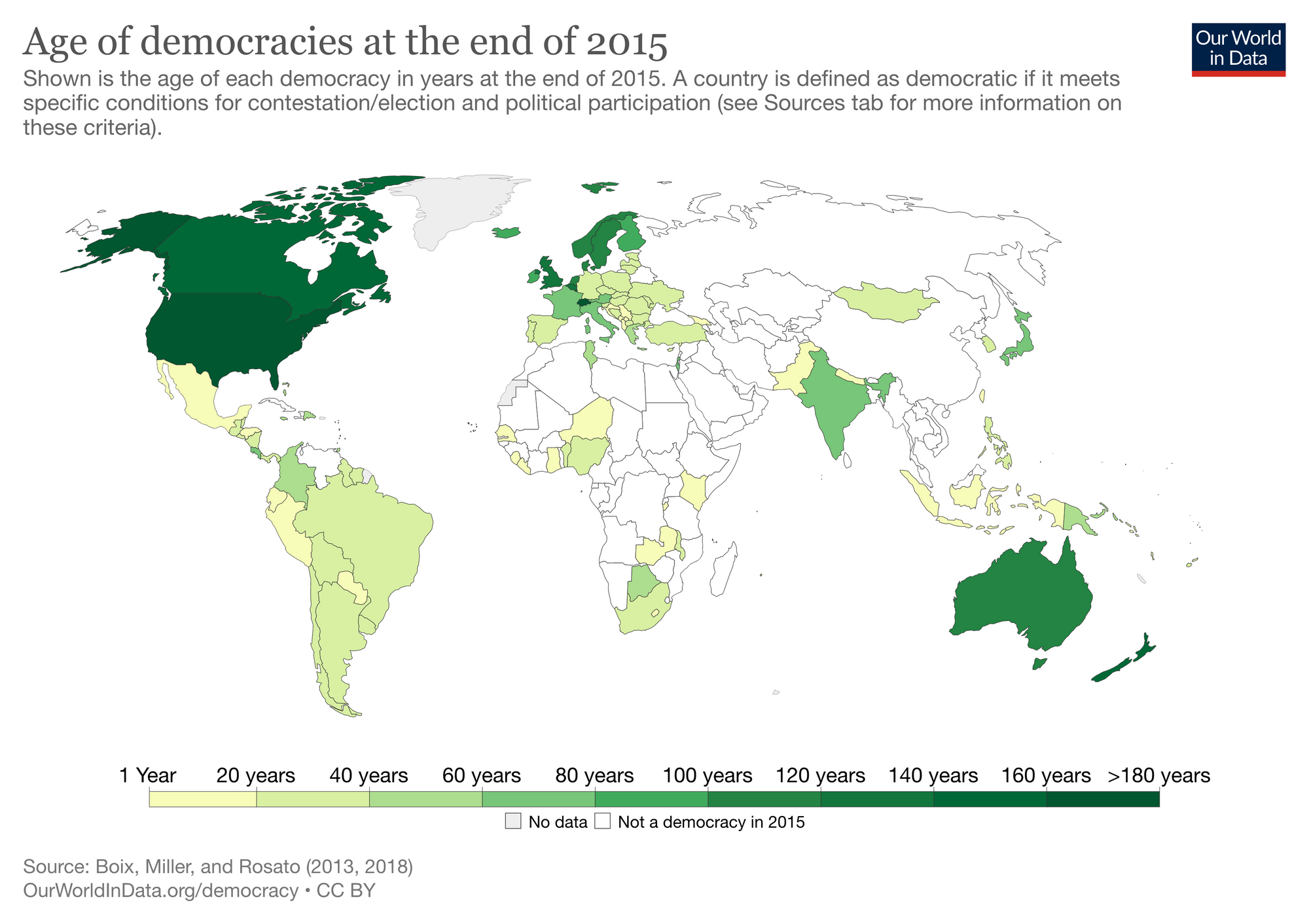
Nature
This section includes information about our planet and the life that inhabits it.
The oceans are (mostly) empty.
Despite taking up over 2/3 of all surface area, our oceans contain <1% of all planetary biomass.
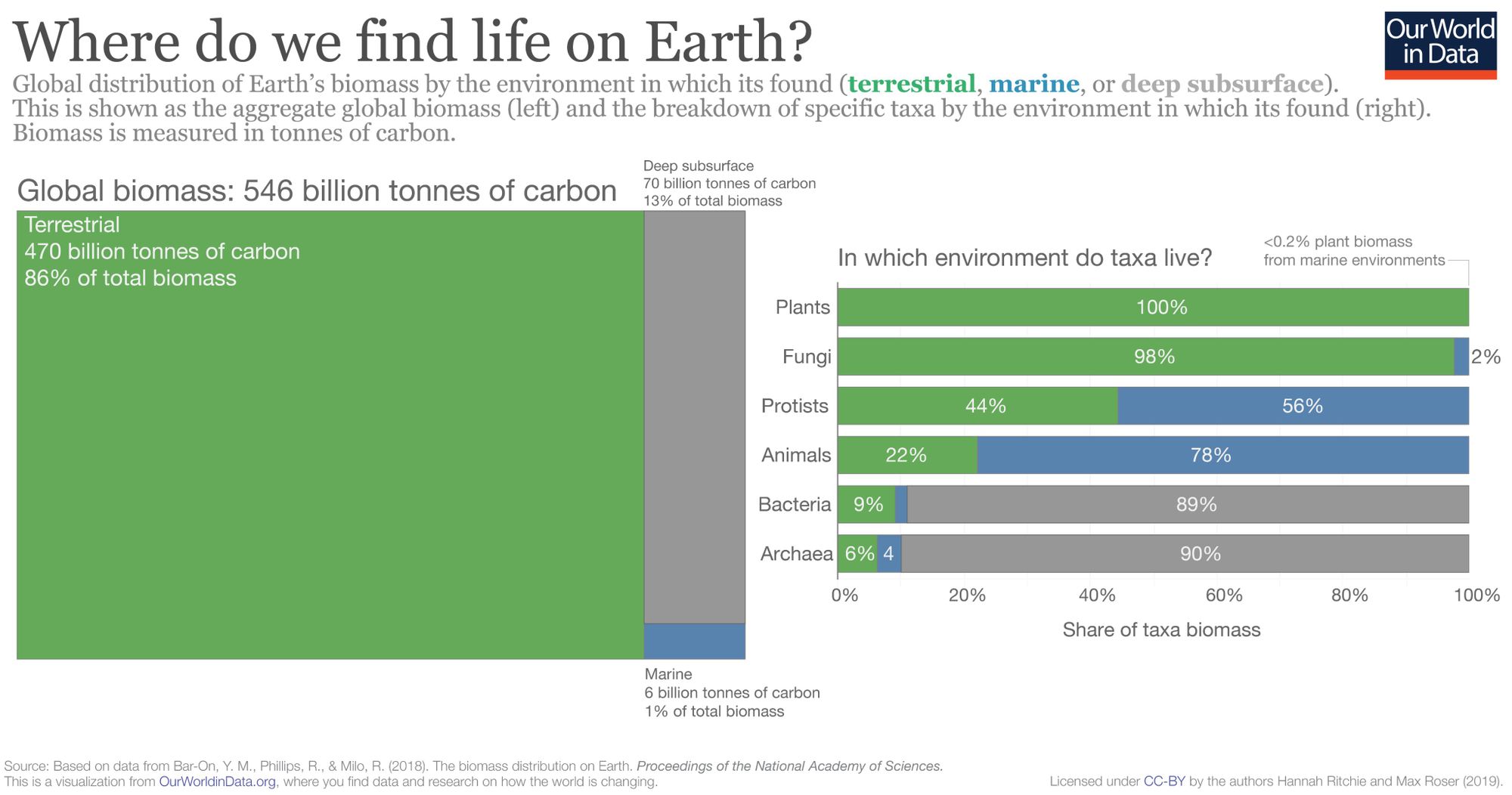
The planet has the capacity for large scale reforestation
A new study from Science reveals that Earth’s capacity for forested area is currently underutilized by 25%. Reforestation remains one of the best ways to reduce greenhouse gases and reverse effects of climate change.
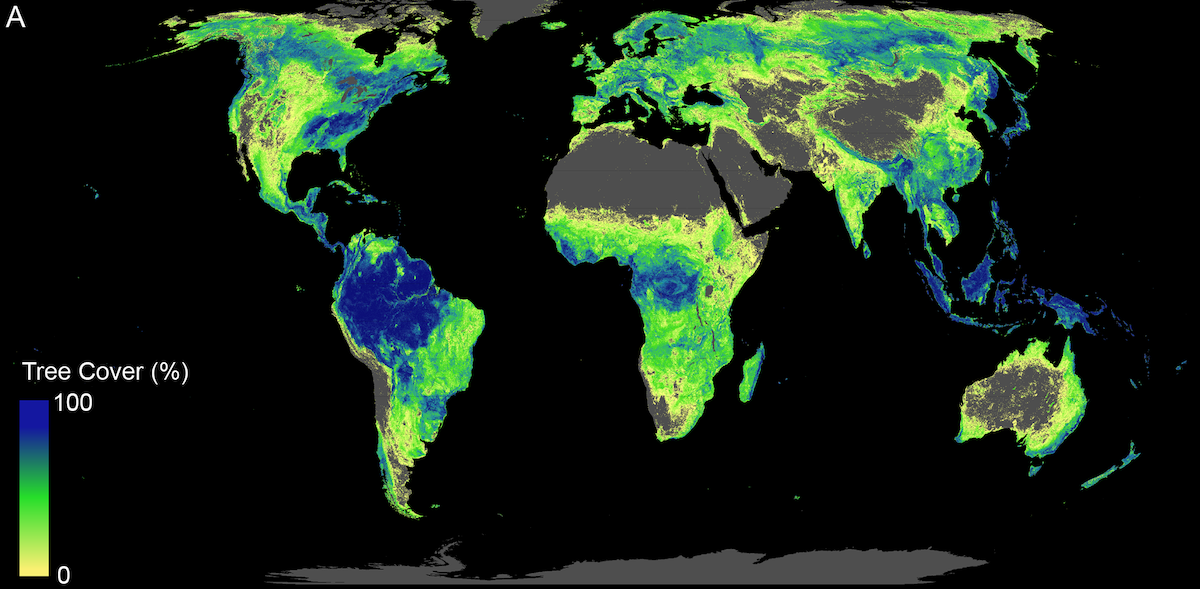
🎉 Thanks for reading!
If you’d like to receive links like these in your inbox each and every week, you can subscribe to my newsletter.